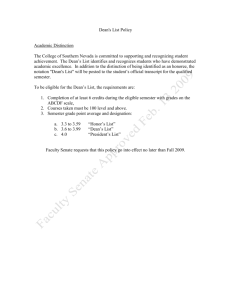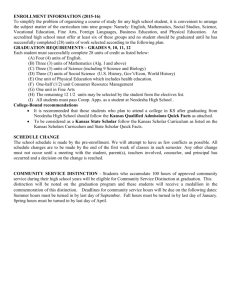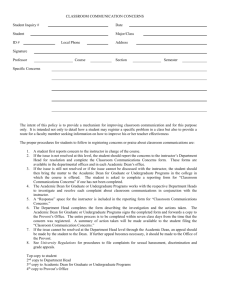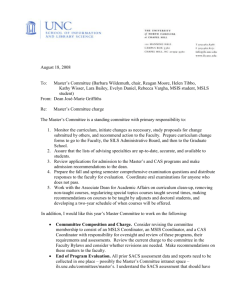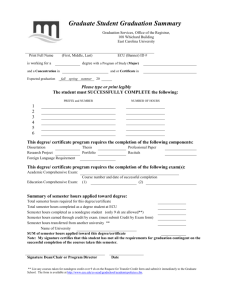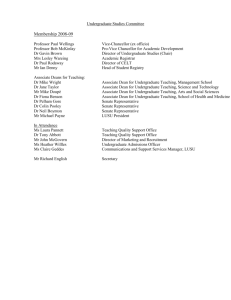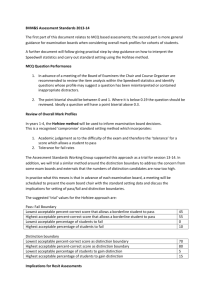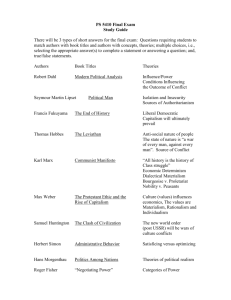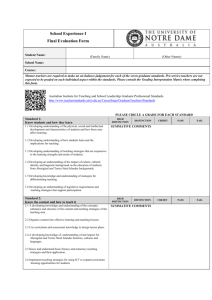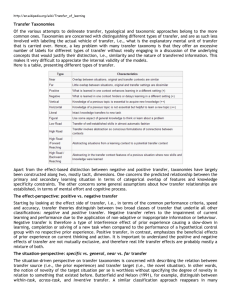Graduating with Distinction Guidelines
advertisement
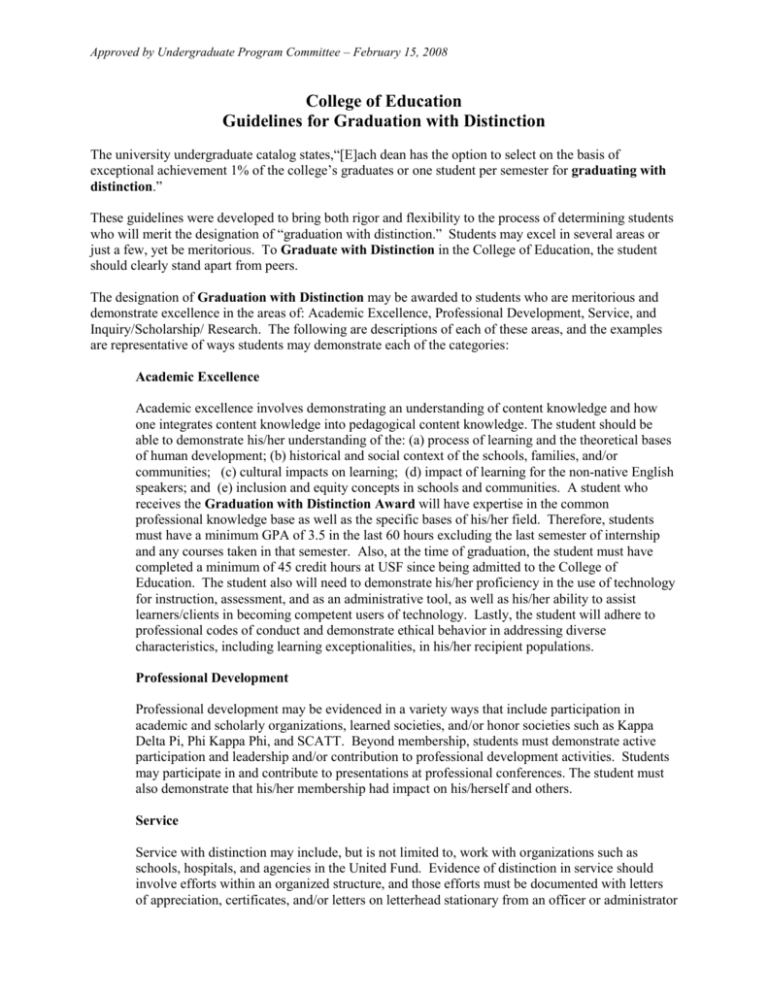
Approved by Undergraduate Program Committee – February 15, 2008 College of Education Guidelines for Graduation with Distinction The university undergraduate catalog states,“[E]ach dean has the option to select on the basis of exceptional achievement 1% of the college’s graduates or one student per semester for graduating with distinction.” These guidelines were developed to bring both rigor and flexibility to the process of determining students who will merit the designation of “graduation with distinction.” Students may excel in several areas or just a few, yet be meritorious. To Graduate with Distinction in the College of Education, the student should clearly stand apart from peers. The designation of Graduation with Distinction may be awarded to students who are meritorious and demonstrate excellence in the areas of: Academic Excellence, Professional Development, Service, and Inquiry/Scholarship/ Research. The following are descriptions of each of these areas, and the examples are representative of ways students may demonstrate each of the categories: Academic Excellence Academic excellence involves demonstrating an understanding of content knowledge and how one integrates content knowledge into pedagogical content knowledge. The student should be able to demonstrate his/her understanding of the: (a) process of learning and the theoretical bases of human development; (b) historical and social context of the schools, families, and/or communities; (c) cultural impacts on learning; (d) impact of learning for the non-native English speakers; and (e) inclusion and equity concepts in schools and communities. A student who receives the Graduation with Distinction Award will have expertise in the common professional knowledge base as well as the specific bases of his/her field. Therefore, students must have a minimum GPA of 3.5 in the last 60 hours excluding the last semester of internship and any courses taken in that semester. Also, at the time of graduation, the student must have completed a minimum of 45 credit hours at USF since being admitted to the College of Education. The student also will need to demonstrate his/her proficiency in the use of technology for instruction, assessment, and as an administrative tool, as well as his/her ability to assist learners/clients in becoming competent users of technology. Lastly, the student will adhere to professional codes of conduct and demonstrate ethical behavior in addressing diverse characteristics, including learning exceptionalities, in his/her recipient populations. Professional Development Professional development may be evidenced in a variety ways that include participation in academic and scholarly organizations, learned societies, and/or honor societies such as Kappa Delta Pi, Phi Kappa Phi, and SCATT. Beyond membership, students must demonstrate active participation and leadership and/or contribution to professional development activities. Students may participate in and contribute to presentations at professional conferences. The student must also demonstrate that his/her membership had impact on his/herself and others. Service Service with distinction may include, but is not limited to, work with organizations such as schools, hospitals, and agencies in the United Fund. Evidence of distinction in service should involve efforts within an organized structure, and those efforts must be documented with letters of appreciation, certificates, and/or letters on letterhead stationary from an officer or administrator Approved by Undergraduate Program Committee – February 15, 2008 or similar authority of the organization. Additionally, the student should provide a summary describing his/her service and its impact on others. Note: Participation in organized service learning activities that are requirements of courses, as well as volunteer work for which the student receives academic credit or monetary compensation should not be included. Inquiry/ Scholarship/ Research On the undergraduate level, scholarly activity may be exhibited in a variety of ways, depending on the opportunities provided to or sought by the student. To demonstrate distinctive work in this area, the student must clearly demonstrate evidence beyond the requirements to successfully complete courses. Outstanding students consistently elect to take advantage of opportunities to increase his/her expertise in research. While it seems logical that a number of opportunities to meet these requirements will be met within the university, they are not limited to these and can take place outside the university context. Examples of evidence may include, but are not limited to: Demonstration of understanding of research by independently completing research projects. Participation in and support of the conduct of research by faculty. Participation in research colloquia. Conducting action research as part of field experiences. Making presentations at professional meetings. Nomination Process The nomination period will be during the semester before the student is scheduled to graduate. Students may be nominated by individual faculty, faculty groups, or student groups. If a student wishes to apply he/she must have either an individual faculty member or faculty group nominate him/her. If a student group wishes to nominate an applicant they would likewise need to have an individual faculty member nominate the student. Upon being nominated, the student will be sent the guidelines and an application form. The student must then assemble the necessary materials with supporting evidence by the established date. Selection Process A committee of three faculty and no more than two undergraduate students representing different majors and/or departments/school will review the application packets and provide a list of recommended students to the dean of the College of Education. Every attempt will be made to select committee members who represent departments/school other than those of the applicants. Since the number of awards may vary depending on the number of graduates each semester, the number of recommendations forwarded to the dean may also vary. The number of students recommended to the dean will be no more than the number of awards to be given that semester. Final decisions on the applications will be made by the dean of the College of Education.
